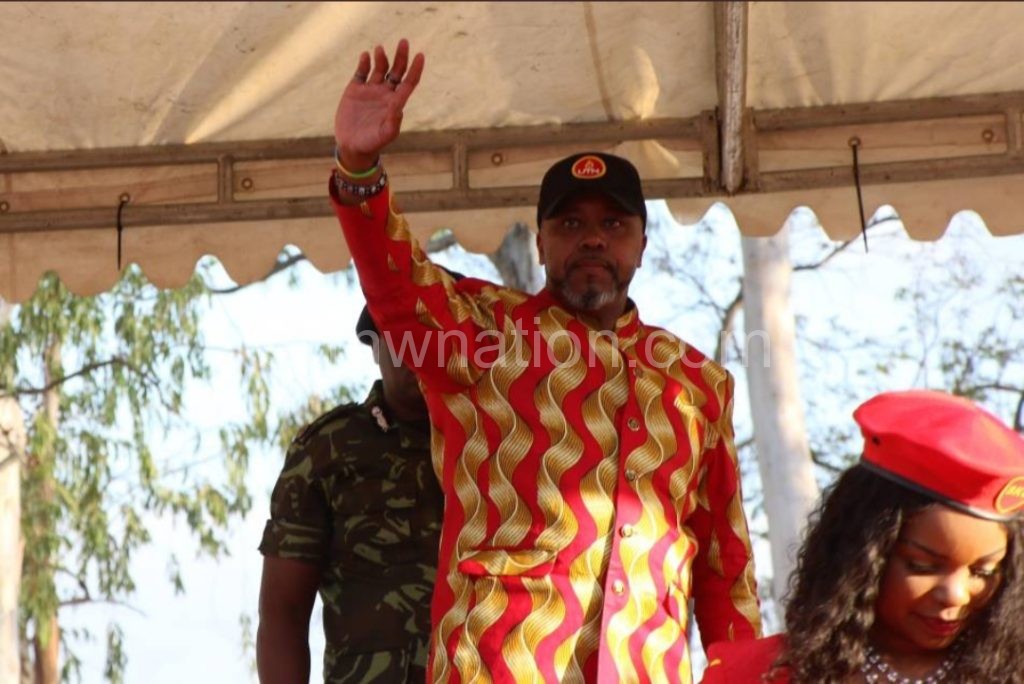Chilima for VP status change
Malawi’s Vice-President and leader of United Transformation Movement (UTM) Saulos Chilima says if elected in 2019, he will facilitate the amendment of the Constitution to provide for functions of a Vice-President.
Speaking boldly at the UTM launch in Ntcheu, which happens to be his home district, Chilima said he will move to amend the law to create a conducive working environment for vice-presidents considering that they have been underutilised by presidents since the advent of democracy.

Chilima acknowledged that vice-presidents have been elected as running mates not on the strength of their capabilities but used by political parties to win votes.
He said he does not want to see his vice suffer the same way most former vice-presidents suffered because of other people who wield much power than the second in command of the country.
He said: “When I become president next year, I will facilitate the amendment of the Constitution to change the office from vice-president to deputy president in order to give the office more authority and certainty.
“As president, I will also ensure that between my office and that of the deputy president, no other office or person assumes more power in between because once that happens, the deputy president loses authority and becomes unable to effectively execute their mandate.”
Chilima, who ditched the governing Democratic Progressive Party (DPP), told the crowd that since multiparty pluralism, vice-presidents have not been empowered as they are only used as conduits for amassing votes during campaign periods.
“I do not want my deputy to go through what I and others before me have gone through,” said the Vice-President.
In an interview, accountability and governance commentator Henry Chingaipe concurred with Chilima that it was time that the functions of a vice-president should not be dependent on the delegation of the president.
He gave an example of the United States of America where a vice-president is president of the Senate, a powerful policy and lawmaking body of government.
Said Chingaipe: “In Malawi, it has been common that a vice-president as running mate is not chosen for work but on the calculus of geographical and political interests. When the person brings in votes, the usefulness ends there.”
He said it was crucial that the Constitution provides for a guide on who to elect as vice-president on the strength of their abilities not region of origin, age or gender.
The 2007 Constitutional Review conference and report of Malawi Law Commission proposed the amendment but no government since then has implemented it.
Chingaipe cautioned: “The DPP made similar promises pertaining to trimming of presidential powers but four years later this has not been done.”
Since the introduction of the Office of the Vice-President in the 1994 Constitution, presidents have failed to click with their respective vice-presidents.
The first democratic president, Bakili Muluzi fell out with his vice Justin Malewezi towards the end of their term in 2003 when the latter expressed ambitions to take over as presidential candidate.
When he paired with Joyce Banda, Bingu began throwing her away slowly to pave way for his brother Peter who has also been in bad working relationship with Chilima.
In 2005, late president Bingu wa Mutharika fell out with his vice Cassim Chilumpha when the latter refused to leave the United Democratic Front, the party that ushered them into government, after Mutharika formed the DPP.
Chilumpha was even charged with treason, which was later dropped for lack of evidence.
Similarly, when then vice-president Joyce Banda disclosed her ambitions to take over from Mutharika at the expiry of his term, the party sidelined her and took away her security.
Although Banda was a victim of the mistrust that comes between a vice-president and president, she also sidelined vice president Khumbo Kachali in favour of a running mate who would give People’s Party the youth and Central Region votes in Sosten Gwengwe.
Private practice lawyer John-Gift Mwakhwawa told The Nation after Joyce Banda’s firing from the DPP in 2010 that there is a problem created by Section 79 of the Constitution, which does not state the functions of the vice-president except the obligation required of them to assist the President.
The Section reads: “There shall be a First Vice-President and, subject to Section 80 (5), a Second Vice-President, both of whom shall assist the President and who shall exercise the powers and perform the functions conferred on the First Vice-President or the Second-Vice-President, as the case may be, by this Constitution or by any Act of Parliament and by the President.”
In Section 80(3), the Constitution provides that the Vice-President shall be elected concurrently with the President and the name of a candidate for the Vice-President shall appear on the same ballot paper as the name of the presidential candidate who nominated him/her.
Political commentators have previously attributed the friction between the Presidents and Vice-Presidents to greed and lack of succession plans in political parties.





